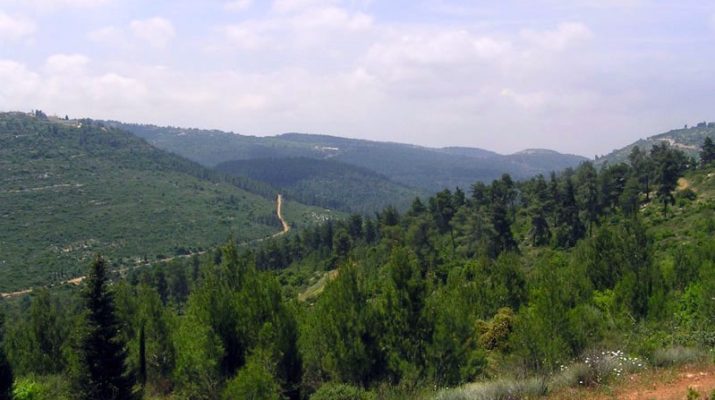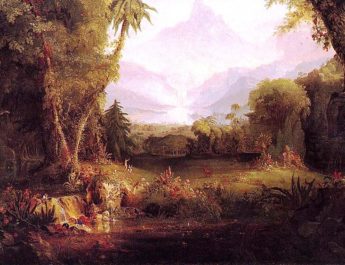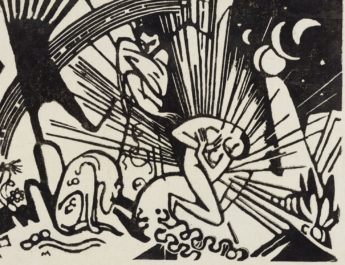Psalm 125
Ordinary B41
A Song of Ascents.A
1 Those who trustB in the LordC are like MountD Zion,E
A “Ascents” = ma’alah. From ma’aleh (ascent, platform, slope, stairs, cliff, elevation, a rise; figuratively, a priority); from alah (to go up, ascend, be high, be a priority; to arise in a literal or figurative sense). This is something that arises, elevation, a journey to a higher pane. This can be used figuratively to mean having a though or being of a superior status. It is often used in a specific sense for something the mounts to a climax. This is step, stair, or high degree.
B “trust” = batach. This is to hide for refuge, be secure or sure. Figuratively, it refers to trust, being confident, or hoping.
C “Lord” = YHVH. From havah (to be, become) or hayah (to come to pass, become, be). This is the name of the God of Israel, the self-existent and eternal one, the tetragrammaton. This pronunciation has been lost to time so “Lord” is generally used in its place.
D “Mount” = har. From harar (hill or mountain). This is mountain, hill, hilly region.
E “Zion” = Tsiyyon. Related to tsyiyyun (signpost, monument); from tsavah (to charge someone, to command, order); from the same as tsiyyah (dryness drought); from a root meaning parched as desert, dry land. Zion can refer to a mountain in Jerusalem as well as another name for Jerusalem itself or the people.
which cannot be moved,F but abidesG forever.H
F “be moved” = mot. This is to shake, slip, falter, stagger, move, fall, give way, waver, be carried.
G “abides” = yashab. This is to sit and so to remain and so to dwell. It is sitting for any reason – as a judge, in order to ambush, or just sitting quietly. Causatively, this can mean settling or marrying. This can also mean continue, endure, or establish.
H “forever” = olam. This is a long scope of time whether in the past (antiquity, ancient time) or in the future (eternal, everlasting).
2 As the mountainsI surroundJ Jerusalem,K
so the Lord surrounds his people,L
from this time on and forevermore.M
I “mountains” = har. Same as “Mount” in v1. See note D above.
J “surround” = sabib. From sabab (turning around, going around; to surround, cast, walk, fetch; to revolve or border in a literal or figurative sense). This is a circuit or a circle. It could refer to an environment, one’s neighbors, or a circular path round about.
K “Jerusalem” = Yerushalaim. From yarah (to throw, shoot, be stunned; to flow as water so figuratively to instruct or teach) + shalam (to make amends, to be complete or sound). This is Jerusalem, dwelling of peace.
L “people” = am. From amam (to darken, hide, associate; creating shadows by huddling together). This is people or nation. It can be used specifically for a tribe, collectively of troops or armies, or figuratively to refer to a flock of animals.
M “forevermore” = ad + olam. Ad is from ad (old, perpetuity, eternity; a duration going back or forward); from adah (to advance or continue; to take away or remove; adorning oneself with ornaments). This is until, before, up to. Olam is the same as “forever” in v1. See note H above.
3 For the scepterN of wickednessO shall not restP
on the land allottedQ to the righteous,R
N “scepter” = shebet. This is a rod, staff, club, scepter, dart, or tribe. Literally a stick that can be used for punishing, writing, fighting, walking, ruling; thus, used figuratively for a clan.
O “wickedness” = resha. From rasha (to be wicked, guilty, make trouble, do wrong; can also be condemn, guilty, inflict punishment; this verb implies disturbing or violating). This is wrong, particularly moral wrong. It can be wickedness, evil, wicked deeds, or something that is ill-gotten.
P “rest” = nuach. This is to rest, calm, camp, free, place, remain, satisfy, settle, station, or wait. It is rest and so implies settling down in a literal or figurative sense. This is perhaps the root verb of the name “Noah.”
Q “land allotted” = goral. Root may mean to be rough like a stone. A lot was probably a small pebble used to determine one’s portion or what one should do (the will of a god or one’s destiny).
R “righteous” = tsaddiq. From the same as tsedeq (rightness, righteousness, just cause, vindication; that which is right in a natural, moral, or legal sense; abstractly equity; figuratively prosperity). This is just, innocent, righteous, righteous one, or lawful.
so that the righteous might not stretch outS
their handsT to do wrong.U
S “stretch out” = shalach. This is to send out, away, send for, forsake. It can also mean to divorce or set a slave free.
T “hands” = yad. This is hand, ability, power. Hand in a literal sense, but also what one can do or the means by which one does it.
U “do wrong” = evel. Perhaps from aval (to deal unjustly, act in a wrongful way, a wrongdoer). This is injustice, wrong, moral evil, acts of violence, or unrighteousness.
4 Do good,V O Lord, to those who are good,W
and to those who are uprightX in their hearts.Y
V “do good” = tob. This is to be good, go well, please.
W “good” = tob. Related to “do good” in v4. From tob (see note V above). This is good, beautiful, pleasant, agreeable, bountiful, at ease. This word is used for goodness as a concept, a good thing, a good person. This can refer to prosperity and welfare as well as joy, kindness, sweetness, and graciousness. So, this is ethically good, but also enjoyably good.
X “upright” = yashar. From yashar (to be straight, right, even, smooth, or agreeable; figuratively, to make something pleasant or prosperous). This is straight, right, level. Also, it is pleasing, whether pleasing God or pleasing other people. So, it is upright or righteous.
Y “hearts” = libbah. 8x in OT. From the same as lebab (the heart, courage, one’s inner self, the mind, or the will); may be related to labab (to encourage; properly, to be encased as with fat; used in a good sense, this means to transport someone with love; used in a bad sense, it can mean to dull one’s senses). This is heart.
5 But those who turn asideZ to their own crooked waysAA
the Lord will lead awayBB with evildoers.CC
PeaceDD be upon Israel!EE
Z “turn aside” = natah. This is to stretch or spread out, to extend, or bend. In can also imply moral deflection.
AA “crooked ways” = aqalqal. 2x in OT. From aqal (to bend, wrong, twist). This is a byway or other kind of winding path. It can also refer to crooked ways in a figurative sense.
BB “lead away” = halak. This is go, come, walk. It is walk literally and figuratively and includes people and animals. It can be used figuratively for one’s moral life – how we walk according to God’s way or against it. It can also refer to the walk of life as in the course one’s life takes, the choices we make, etc.
CC “evildoers” = paal + aven. Literally, “workers of iniquity.” Paal is to do, make, work, or accomplish. Generally refers to regularly repeated or systematic action – so, to practice. Aven – root may mean panting as one does when expending a lot of energy, especially when it comes to nothing. This is nothingness, trouble, sorrow, distress, wickedness, evil, harm, sorrow, misfortune, and mischief. It is also used specifically to refer to idols.
DD “peace” = shalom. Related to “Jerusalem” in v2. From shalam (see note K above). This is completeness, soundness, welfare, favor, friend, good health. It is to be safe and figuratively well, happy, at peace, friendly. Abstractly, it includes the ideas of welfare and prosperity (not in excessive wealth, but in having enough).
EE “Israel” = Yisrael. From sarah (to persist, exert oneself, contend, persevere, wrestle, prevail) + el (God or god). This is Israel, meaning God strives or one who strives with God; new name for Jacob and for his offspring. This refers to the people and to the land.
Image credit: “Jerusalem Mountains” by Maglanist, 2008.




